Full-time on-campus applicants
The on-campus Juris Doctor (JD) degree is a three-year, full-time program that incorporates academic and practical learning to prepare one to practice law or work in a related field.

Full-time on-campus enrollment
The on-campus Juris Doctor (JD) degree is a three-year, full-time program that incorporates academic and practical learning to prepare one to practice law or work in a related field.

Completed applications must be submitted online to ASU Law through LSAC and include the following:
All applicants must register with LSAC’s Credential Assembly Service (CAS). An application for admission may include a valid LSAT or JD-Next score (excludes applicants applying to the ASU Achievement program).
An LSAT score is valid for five years. LSAC will report all LSAT scores for the past five years. For applicants with both LSAT and JD-Next scores, scores from both examinations will be considered.
JD-Next scores must be submitted to ASU Law by Aspen Publishing. ASU Law does not accept self-reported JD-Next scores.
You must have a separate transcript from each undergraduate and graduate institution you attended sent to LSAC. Learn more about requesting transcripts on the LSAC website.
The personal statement should give the committee a better picture of who you are beyond your academic achievements and resume. It should be compelling, well-written and include some discussion of why you want to go to law school. It is also an opportunity to highlight specific reasons for your interest in ASU Law. Your personal statement should be no more than three pages, double-spaced and font size no smaller than 11 point.
Your resume should include details about your educational background, work history, military service, leadership roles, honor societies, scholarships, extracurricular activities, public/community service, honors and awards, publications, foreign language proficiencies, and any other significant achievements and involvements. As to work history, include significant employment during and post-college (including organization name, dates of employment and hours worked). Your resume should be no more than two typed pages and in a font size no smaller than 11 point.
If you answer "yes" to any of the questions in the Character and Fitness section, you must include a separate statement providing a complete description of your actions and full details of the charges and sanctions against you. For example, to be complete, the statement must include a description of all charges or adjudications, including the level of degree and whether it is a felony or misdemeanor. You also must include the date(s) of the matter(s), the status or final disposition of the charge(s), (with the type of plea, such as, not guilty, no contest, Alford or guilty) including your current status with the disciplinary or criminal authorities (for example, the status of your probation or parole), and the name and address of the authority in possession of those records. You must also include any charges that have been expunged, sealed or set aside, even if told you do not need to by a judge or attorney. If you participated in a deferment program in order to expunge a criminal activity, you will also need to include that information. Additionally, you must provide your personal account of the events that led to the charges or discipline.
In order to be considered for any of our binding admission programs, you must sign and submit the binding admission contract provided as part of the application.
Required for foreign educated applicants. Please refer to special instructions here.
An application for admission may include a valid LSAT or JD-Next score. Other standardized tests are not accepted (excludes applicants applying to the ASU Achievement program).
If you are applying under our test optional variance, please indicate you are applying without a test score under the "Test Information" section of the application. Learn more about the test-optional admissions pathway. Under the test optional variance, applicants who do not have a valid LSAT or JD-Next score may apply without a test score. Applicants who have valid LSAT or JD-Next scores must include the test scores with their application.
LSAT scores are transmitted through LSAC’s CAS service. An LSAT score is valid for 5 years. Your LSAT score is considered valid if earned on or after June 2021. LSAC will automatically report all LSAT scores for the past five years.
JD-Next is administered and transmitted by Aspen Publishing. JD-Next score reports must be submitted to ASU Law by Aspen Publishing and may not be self-reported. Please note that if you have any reportable LSAT score(s) on file, we will use that score in evaluating your application, even if you submit a JD-Next score.
ASU Law accepts up to two letters of recommendation. The recommender should submit the letter directly to LSAC. Please note that since letters of recommendation are optional, the Admissions Office will not wait for letters to complete your file for review.
Since 2002, ASU has been committed to inclusive excellence. Our charter states that ASU is “a comprehensive public research university, measured not by whom it excludes, but by whom it includes and how they succeed; advancing research and discovery of public value; and assuming fundamental responsibility for the economic, social, cultural and overall health of the communities it serves.” With this in mind, please discuss what experiences and perspectives you would bring to the ASU Law community.
If you claim to be a resident of Arizona, you must submit the residency form.
An applicant has the option to submit additional addenda to explain undergraduate performance, standardized test performance and any other information you would like to provide the admissions committee. Addenda should be one to two double-spaced, typed pages and in a font size no smaller than 11 point.
You may submit an optional elevator pitch video as part of your application in addition to your written materials. The elevator pitch is a concise and compelling summary of yourself that shows your oral advocacy skills utilizing one of our prompts. You may discuss why ASU Law, why law, why law school now, an interesting story that happened to you recently or a famous person you would like to meet. The video should be no longer than 1 minute.
You should create or upload an unlisted YouTube video and provide the link in a document that you upload with your application materials. To create or upload an unlisted YouTube video, take the following steps:
ASU Law may invite applicants to participate in a virtual admissions interview with members of the Admissions Committee and ASU Law community. Applicants invited to interview will receive an email with further information about the interview process.
ASU Law offers binding and non-binding admission programs. Our binding admission programs are designed for applicants who are certain they want to attend ASU Law. When completing the application the applicant must choose from one of the following programs for consideration.
The admissions committee reads files in the order they are completed and it is in your best interest to apply early in the cycle well in advance of the priority deadline of February 28. Admission and scholarship decisions are made on a rolling basis, therefore, for the best consideration, applicants should make every effort to apply as early as possible.
The O’Connor Merit Scholars Program is a binding commitment program designed for those applicants who are certain they want to attend ASU Law. There is no minimum requirement.
The O’Connor Honors Program is designed to recruit and reward academically exceptional students who are civic-minded, have demonstrated leadership potential, and who have researched their law school options and are certain they want to attend the Sandra Day O’Connor College of Law. The O’Connor Honors Program is a binding program tailored for applicants with high academic credentials — applicants must have an LSAT score of at least 165 and a cumulative undergraduate GPA of at least 3.9 as calculated by LSAC.
Admitted applicants will be designated “O’Connor Fellows” and will enjoy the following benefits:
In the spirit of Justice Sandra Day O’Connor and to continue her legacy, O’Connor Fellows are expected to give back to the community by providing 40 hours of pro bono work each year addressing important social, economic and political problems or advancing civil discussion and civic action.
The Indian Law Leadership Program is designed to recruit and reward exceptional students who have demonstrated leadership potential and ties within Indian Country, and who have researched their law school options and are certain they want to attend the Sandra Day O’Connor College of Law. The Indian Law Leadership Program is a binding program tailored for applicants with experience in Indian Country, ties to a tribal community and an interest in pursuing a job in Indian law in the future. The purpose of the Indian Law Leadership Program is to legally train and educate those who have already demonstrated a commitment toward Indian Country and will continue to give back in the future; therefore, there are no minimum LSAT and GPA requirements to apply to this program. Applicants are required to submit a statement (no more than two (2) pages, double-spaced and font size no smaller than 11 point) discussing any leadership experience in and ties to Indian Country and future goals. Please note, this is in addition to your required personal statement.
The ASU Achievement Program allows applicants who meet certain criteria to apply to the JD program without taking the LSAT. In general, the applicant must have earned or will earn a bachelor's degree from ASU within a particular time frame or be applying as a joint degree candidate. If you are interested in applying to the ASU Achievement Program, please contact our office before applying or registering with LSAC.
In order to be eligible for this program, the applicant must satisfy all requirements for one of the options listed below:
Any Achievement applicants with a valid LSAT score on file with the LSAC or who register for the LSAT will have their application and/or offer of admission withdrawn.
*Any joint degree applicant admitted to the JD program (under Option B above) who does not also earn admission to the other graduate program for joint enrollment will have their admission to ASU Law rescinded.

Review of applications for admission and scholarship are done on a rolling basis, therefore applicants are encouraged to apply as early in the admissions cycle as possible. The admissions committee will begin reviewing applications as they are marked complete. The admissions committee aims to return decisions within 15-20 business days from the date the application is marked complete. However, the admissions decision timeframe may increase as we approach the priority application deadline of February 28.
Applicants are responsible for ensuring that all required documents are received by our office. Applicants will typically receive a confirmation email and instructions on accessing the application status checker within three business days of submitting the electronic application.
ASU Law allows applicants to use generative artificial intelligence (AI) in the preparation of their application materials. Applicants are expected to use this technology responsibly and must certify that the information they submit in their application to ASU Law is true.
Be aware that during the application review process, the admissions committee may request additional information to be provided. Please check your email regularly and ensure that your voicemail box is set up and can receive messages should the Admissions Office need to contact you to request information.
ASU Law has a new test-optional pathway approved through a five-year American Bar Association Standard 503 variance beginning with the application for fall 2026, reflecting our commitment to reducing barriers to legal education and expanding access to justice in communities that need it most.
